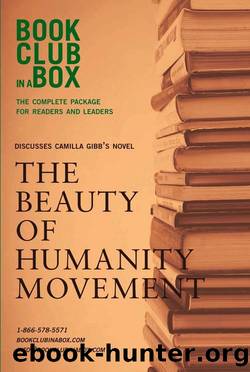Bookclub-in-a-Box Discusses the Beauty of Humanity Movement, by Camilla Gibb by Marilyn Herbert

Author:Marilyn Herbert
Language: eng
Format: epub
Publisher: Bookclub-in-a-Box
Published: 2011-01-15T00:00:00+00:00
Dao
⢠Dao, a dissident poet and intellectual, was Hung's mentor, as well as the father of Binh and husband of Amie.
⢠In the 1940s, Dao was a regular at Hung's pho shop and the most articulate of the group of artists and intellectuals who gathered to debate the complicated politics of the time.
⢠Charismatic and easily able to command a room, Dao declared, âPolitics must not be the domain of the learned and the privileged, but that of every man and woman, especially the ones behind the ploughs.â (p.49) Dao brought politics down from its pedestal so that people like Hung could learn and understand.
⢠In 1954, when Vietnam was liberated from colonial rule, Dao turned his attention to the realities of a free Vietnam and the role that learned men should play. When the Party called upon artists and intellectuals to lead the masses toward enlightenment by promoting the principles of Lenin and Marx, Dao voiced his opposition. âIs this really the job of the artist? To be a Party mouthpiece, a sloganeer?â (p.52)
(see Legacy/Suppression of Art, p.62)
⢠With Dao's criticism of the ruling party mounting, and the risks to his safety increasing, he entrusts his journals to Hung, âBecause you are one of us. One of our movement to keep the beauty of humanity alive.â (p.67)
⢠Confident that words and ideas could change the world, Dao and his colleagues publish Fine Works of Spring, their first collection of writings critical of the ruling party with its devastation of the countryside.
⢠When the Department of Propaganda and Political Education descend on Hung's shop to seize all copies of Fine Works of Spring, and to recruit the group to their cause, Dao angrily proclaims, âWhat is art if the critical eye turns blind, if we can no longer use it to comment independently on the state of the world?â
(p.129)
⢠With the release of Fine Works of Autumn, the second issue of their journal, Dao and his allies are visited again, this time by members of the military who seize and burn the copies. Still defiant, Dao and his colleagues secretly move their printing presses and issue Nhan Van (Humanism), an inflammatory tabloid-style magazine.
⢠With all Dao's education, Hung discovers that Dao does not really know or understand the people for whom he speaks, the peasants. When Hung returns from witnessing the horrors of his childhood village, he receives little empathy from Dao, and is let down with the realization that Dao's life experiences are limited to the abstract.
⢠Hung, who knows the first-hand consequences of the government's policies, understands that words alone will not address the pain. He tells Dao that ânothing is as it seems.â (p.128) Hung challenges
Dao's ideological perspective and forces Dao to look beyond the theory to the reality of life.
⢠Under the cover of darkness, Dao delivers the fourth edition of Nhan Van to Hung, telling him that he went into the countryside, to his wife's village, and witnessed the barbaric crimes of land reform for himself.
Download
This site does not store any files on its server. We only index and link to content provided by other sites. Please contact the content providers to delete copyright contents if any and email us, we'll remove relevant links or contents immediately.
Happiness by Di Leo Jeffrey R.;(160)
Kubrick Red : A Memoir by Simon Roy; Jacob Homel(127)
The History of the Reign of Ferdinand and Isabella the Catholic â Volume 3 by William Hickling Prescott(122)
Ray Bradbury by Eller Jonathan R.;Touponce William F.;Nolan William F.; & William F. Touponce(118)
Forms of List-Making: Epistemic, Literary, and Visual Enumeration by Roman Alexander Barton; Julia Böckling; Sarah Link; Anne Rüggemeier(112)
N by E by Rockwell Kent(94)
Walter Scott at 250: Looking Forward by Caroline McCracken-Flesher; Matthew Wickman(91)
Bookclub-in-a-Box Discusses Small Island, by Andrea Levy by Marilyn Herbert(90)
Bohemians by David Weir(90)
Bitter Carnival by Michael Andr Bernstein;(89)
The Collected Novels by Khushwant Singh(88)
One Thousand Questions in California Agriculture Answered by Edward J. (Edward James) Wickson(88)
The Residues, Part One Collected Writings 1990-2020 by Stephen Barber(88)
My Love Must Wait by Ernestine Hill(85)
The Stone Lion and Other Chinese Detective Stories by Yin-Lien C. Chin(85)
Milton's Ovidian Eve by Mandy Green;(82)
Station Life in New Zealand by Lady (Mary Anne) Barker(81)
The Perfect Tribute by Mary Raymond Shipman Andrews(80)
Sisters of Tomorrow by Sisters of Tomorrow- The First Women of Science Fiction (epub)(80)
